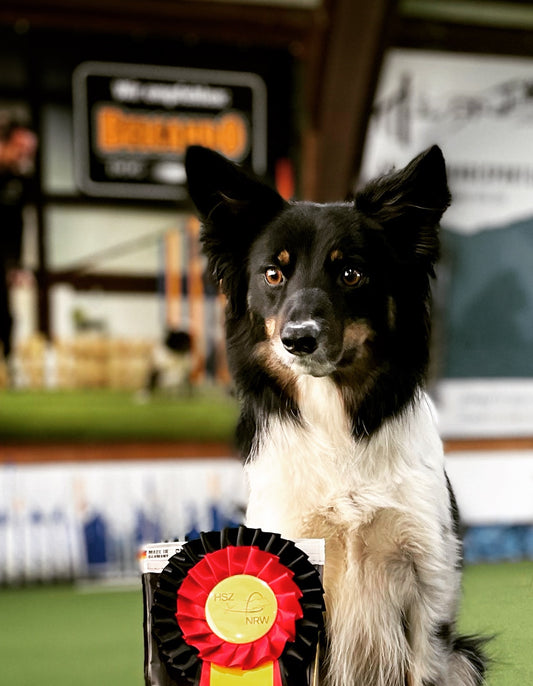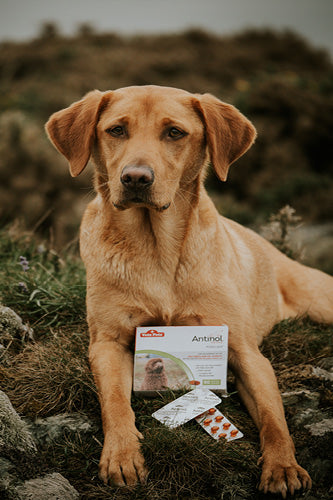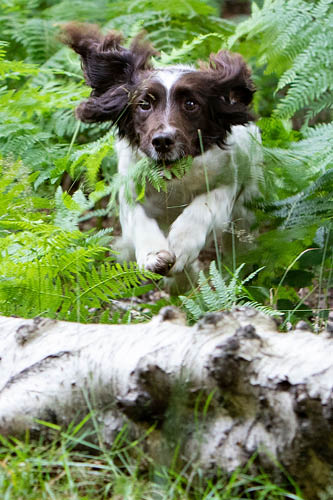“Lizzie was absolutely devastated and sobbed at bedtime. She thought that, because of Bella's mobility problems, she wouldn't enjoy life and was going to die."
Bella is only 9. Her best friend, 5-year-old Lizzie, was distressed, thinking that Bella struggling to jump into the car meant she was old and might not be with the family for much longer.

Bella had a tough start in life. Physically abused during her gundog training, Bella was then forced to breed in a puppy farm before being dumped in a “kill shelter” in Ireland. Luckily, a rescue charity came to her aid, and Steve and his family rehomed her.
“The vet we first saw believed she didn't reach average Springer Spaniel size, because she was bred from too young and hadn't reached maturity. They think this might have contributed to her early-onset mobility problems,” says pet parent Steve.
Steve has had Bella for seven years now and has watched her go from strength to strength.
“When she first came home, she was timid and retiring, scared of everything. Over the next few years, she's grown into a wonderful, lovely, bouncy, happy Springer. She idolises the children and follows them everywhere.”
When she was younger, Bella was an agility whizz. These days, when she isn't rooting around in the undergrowth or chasing balls, she likes to take her agility skills “off-road” with Lizzie, jumping logs and anything they can find on their walks.

So when heading for the beach last year, while on holiday, the family was shocked to find Bella couldn't get into the car.
"Normally, her and Rosie, our other dog, hop up into the back together. This time, Rosie jumped in and Bella didn't. She looked like she wanted to but wouldn't make the jump."
Steve and his wife knew they needed to get her some help.
“It was a real shock. We suddenly realized she was struggling. And once we noticed the car thing, we were more aware of other problems. She had really slowed down, and we hadn't noticed. We felt awful. She used to be able to keep up with Rosie and race her to the ball, but she started to give up or not even bother. She had turned into a grumpy old lady. She was snappy with other dogs when we were out and kept having a go at Rosie or the cats.”
When they got home, Steve called his friend Chloe, a veterinary nurse who ran mobility clinics.
Chloe says, "Bella was stiff and sore in her back legs. She was having difficulty with her mobility. I suggested they try her with Antinol®. I had seen the benefits of using it in other dogs."
Steve's wife is an animal nutritionist. She was skeptical at first, but Steve says, “She looked into the science behind it and read all of the clinical evidence. She was impressed, so we thought it was worth a try."
For the first fourteen days Bella had double the number of capsules, as recommended. The family saw a difference in her quickly. She was her good old self, bouncy, happy and enthusiastic.
"At dinnertime, she was play-chasing the cats, bowing at them and hopping all over the kitchen like a coiled spring!"
Once she had been taking Antinol® for a while, she wasn't hesitating to jump in the car anymore. She was ready to get back to family adventures. The family are over the moon.

“She's developed this extreme enthusiasm, especially at mealtimes, she's so bouncy! And the grumps are gone. I can't remember the last time she had a go at another dog on a walk."
There have been so many changes in Bella.
“We're amazed at how big a difference Antinol® has made. We are so happy that we have our normal Bella back. She can run around and keep up with Rosie again. We can carry on as a family on our adventures in the woods. We can keep on having fun together.”
Steve has now started giving Antinol® to Rosie, who is a couple of years younger than Bella.
"Antinol® has worked wonders for Bella, so we hope it can support Rosie's mobility in the long term too."
Bella's best friend, little Lizzie, rounds it up nicely:
"Bella's Antinol® means she can go on adventures with me again!"









